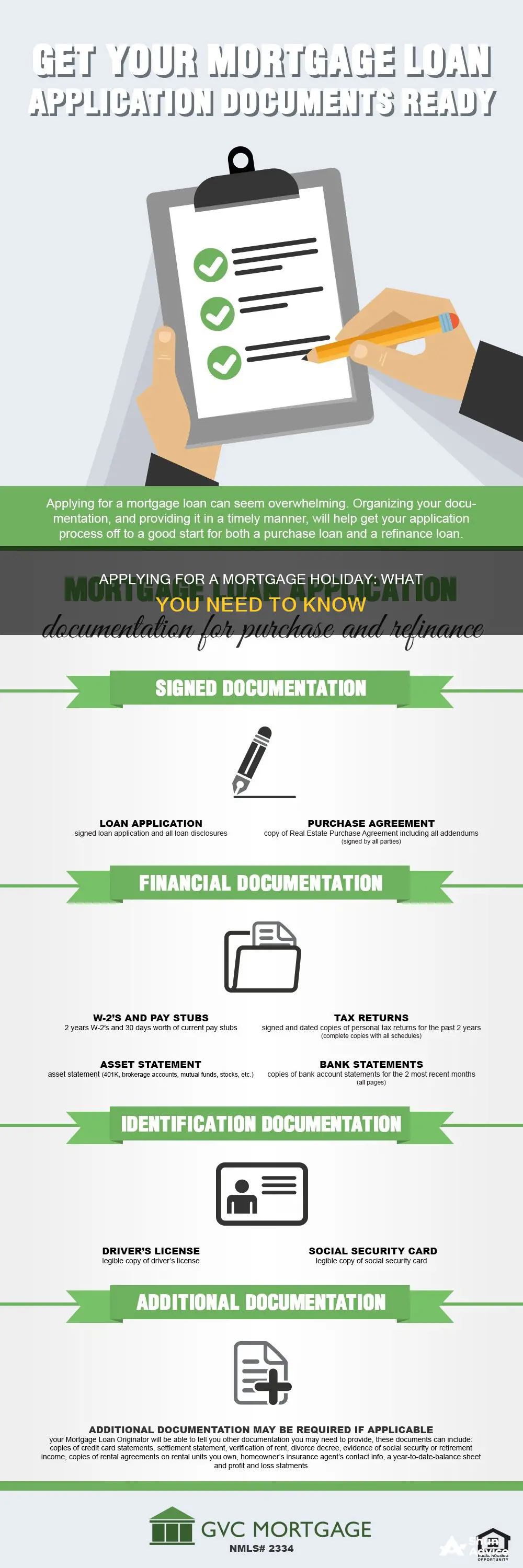
If you're struggling to make mortgage payments, you may be considering applying for a mortgage holiday. This is an agreement made between a borrower and a lender that allows the borrower to take a break from their mortgage repayments for a temporary period. It's important to note that not everyone will qualify for a mortgage holiday, and there are potential pitfalls to consider, such as increased monthly instalments after the holiday ends. To apply, you will need to contact your lender to discuss your options and determine if you meet their conditions.
What You'll Learn

Who is eligible for a mortgage holiday?
Eligibility for a mortgage holiday depends on the lender's criteria. However, there are some general criteria that most lenders follow. Firstly, you must be experiencing financial difficulties to be eligible for a mortgage holiday. Lenders will not usually offer repayment holidays if you are not facing financial challenges. Secondly, you must have had the mortgage for a certain period, typically for a minimum of 12 months. This means that you cannot take a repayment holiday within the first year of your mortgage.
Thirdly, you must be up to date with your payments over a certain period before you can qualify for a payment break. This means that you cannot be in arrears with your mortgage. Fourthly, some lenders require that you have previously overpaid your mortgage, building up credit that can be used during the holiday period. Fifthly, your property must not be rented out, as some residential mortgages do not allow for payment holidays if the property is rented. Sixthly, you must meet a minimum loan-to-value (LTV) requirement, which is often around 80% LTV. This means that if your property is worth £200,000 and you currently owe £150,000 on your mortgage, your LTV would be 75%, and you would be eligible for a mortgage holiday.
Adding Your Child's Name to Your Mortgage: What You Need to Know
You may want to see also

How to apply for a mortgage holiday
A mortgage holiday can be a lifeline for many mortgage holders, but it should only be considered if it is absolutely necessary. It is important to note that not everyone will qualify for a mortgage holiday, and there are potential pitfalls to be aware of. Firstly, you will still have to pay interest during a mortgage holiday, which can result in having to pay more overall. Additionally, if you simply stop paying without approval from your lender, you will be in arrears on your mortgage and your home will be at risk.
To apply for a mortgage holiday, the first step is to check your mortgage contract to see if your lender offers them. If they do, you will need to contact your lender to discuss your options and find out how to apply. Most lenders will have an online application process, but some may require you to fill out a form or call them. It is important to note that you should not call your lender unless necessary, as they currently have reduced staff and higher demand, resulting in extremely long waiting times.
When you contact your lender, they will let you know if you meet their conditions for a mortgage holiday. These conditions may include being up to date on your mortgage payments, having a certain loan-to-value ratio, and having made full payments on time for a certain period. For buy-to-let mortgages, landlords will also have to certify that their tenants are struggling to pay rent. If you do not meet the conditions for a mortgage holiday, your lender may still be able to offer tailored support or alternative repayment plans.
It is important to carefully consider your options before applying for a mortgage holiday, as it could affect your borrowing in the future. Additionally, there may be other ways to ease the burden of your mortgage payments, such as finding a cheaper mortgage deal or taking out insurance to cover your payments.
Mortgage and Marriage: Adding a Spouse to Home Loans
You may want to see also

Mortgage holiday pitfalls
A mortgage holiday can be a lifeline for many mortgage holders, but it is not without its pitfalls. Firstly, it is important to note that a mortgage holiday is not a payment waiver, it simply defers the payment. This means that you will still have to pay interest on the amount, which can result in having to pay more overall. For example, if you take a 3-month holiday, the interest over those 3 months will be added to your outstanding balance, increasing your total debt. As a result, your monthly payments will increase to cover the shortfall, and you may end up paying more in the long run.
Another pitfall to consider is that a mortgage holiday should only be taken as a last resort. Before applying for a mortgage holiday, it is advisable to minimize discretionary spending and explore other options such as finding a cheaper mortgage deal or taking out insurance to cover your payments. Additionally, some lenders may require you to have made overpayments in the past to be eligible for a mortgage holiday.
It is also important to note that not all lenders offer mortgage holidays, and the conditions may vary. The length of the holiday, the minimum period of on-time payments, and the requirement to be up to date with payments can differ between lenders. Furthermore, if you simply stop paying without approval from your lender, you will be in arrears on your mortgage and your home may be at risk.
Finally, a mortgage holiday may not be the best option if you are looking for long-term financial relief. While it can provide temporary relief, the increased payments after the holiday may become a strain on your finances. Therefore, it is crucial to carefully consider your options and seek financial advice before making any decisions.
Adding Your Partner to Your Mortgage: What You Need to Know
You may want to see also

Alternatives to a mortgage holiday
If you are struggling to keep up with your mortgage repayments, you could consider alternatives to a mortgage holiday, which may have higher interest costs in the long run. Firstly, you should minimise discretionary spending and only consider a mortgage holiday as a last resort.
If you have previously overpaid on your mortgage, your lender may allow you to underpay your mortgage until you can get back on track. Some lenders will only allow a mortgage holiday if you have previously overpaid. You could also switch to an interest-only mortgage for up to six months to reduce your monthly repayments. This will result in paying more interest overall, but it will reduce your monthly outgoings.
Loan modification is another alternative, which changes the terms of your mortgage to make payments more manageable. This could involve lowering the interest rate, extending the term, or changing other conditions of the loan. You could also discuss a repayment plan with your lender, which spreads the missed payments over an extended period. This can reduce the immediate financial burden without significantly altering the terms of your mortgage.
It is important to be honest and open with your lender about your financial situation, as they will be able to advise on the best course of action.
Adding Your Spouse to Your Mortgage: What You Need to Know
You may want to see also

When to apply for a mortgage holiday
If you are struggling with your mortgage payments due to a temporary or sudden short-term financial issue, a mortgage holiday may be a good option to consider. This could include situations such as a loss of income, maternity leave, or other similar circumstances. It is important to note that not all lenders offer mortgage holidays, and your specific mortgage contract may not allow for it. Therefore, the first step is to carefully read your mortgage contract, paying close attention to the terms and conditions, to see if a mortgage holiday is mentioned.
Additionally, lenders often have requirements that borrowers must meet to qualify for a mortgage holiday. These requirements may include being up to date on your mortgage payments and having a good payment history. Some lenders may also require you to have overpaid on your mortgage in the past. It is important to contact your lender directly or speak with a mortgage advisor to discuss your options and determine if you are eligible for a mortgage holiday.
It is worth noting that a mortgage holiday is not an interest holiday. While your monthly instalments may be halted or reduced during the holiday period, you will still have to pay interest, which can result in higher overall costs. Therefore, it is advisable to consider alternative options, such as restructuring your repayment plan or finding a cheaper mortgage deal, before opting for a mortgage holiday.
In summary, the right time to apply for a mortgage holiday is when you have explored all other options and determined that a temporary break from your mortgage repayments is necessary to manage your financial situation.
Applying for a HARP Mortgage: A Step-by-Step Guide
You may want to see also
Frequently asked questions
Contact your lender to find out how to apply for a mortgage holiday. They will let you know if you meet their conditions and send you any application forms. Most lenders will have an online application process, but you can also apply by phone.
Requirements vary depending on the lender. Generally, you must be up to date on your mortgage payments, and your income has been affected. For buy-to-let mortgages, landlords must also certify that their tenants are struggling to pay rent.
You can take a break from your mortgage payments for up to six months. However, this depends on your lender and your previous payment history.
Yes, you will still have to pay interest during a mortgage holiday, which can result in higher overall costs. Additionally, Martin Lewis warns that it could affect your future borrowing.







